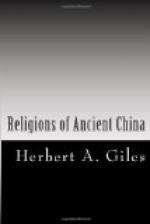Another writer enlarges on the view that kuei “disembodied spirit” is the same as kuei “to return.” “At death, man’s soul returns to heaven, his flesh to earth, his blood to water, his blood-vessels to marshes, his voice to thunder, his motion to the wind, his sleep to the sun and moon, his bones to trees, his muscles to hills, his teeth to stones, his fat to dew, his hair to grass, while his breath returns to man.”
Attributes of God.—There was a certain philosopher, named Ch’in Mi (died A.D. 226), whose services were much required by the King of Wu, who sent an envoy to fetch him. The envoy took upon himself to catechise the philosopher, with the following result:—
“You are engaged in study, are you not?” asked the envoy.
“Any slip of a boy may be that,” replied Ch’in; “why not I?”
“Has God a head?” said the envoy.
“He has,” was the reply.
“Where is He?” was the next question.
“In the West. The Odes say,
He gazed fondly on the West,
From which it may be inferred that his head was in the West.”
“Has God got ears?”
“God sits on high,” replied Ch’in, “but hears the lowly. The Odes say,
The crane cries in the
marsh,
And its cry is heard
by God.
If He had not ears, how could He hear it?”
“Has God feet?” asked the envoy.
“He has,” replied Ch’in. “The Odes say,
The steps of God are
difficult;
This man does not follow
them.
If He had no feet, how could He step?”
“Has God a surname?” enquired the envoy. “And if so, what is it?”
“He has a surname,” said Ch’in, “and it is Liu.”
“How do you know that?” rejoined the other.
“The surname of the Emperor, who is the Son of Heaven, is Liu,” replied Ch’in; “and that is how I know it.”
These answers, we are told, came as quickly as echo after sound. A writer of the ninth century A.D., when reverence for the one God of ancient China had been to a great extent weakened by the multiplication of inferior deities, tells a story how this God, whose name was Liu, had been displaced by another God whose name was Chang.




